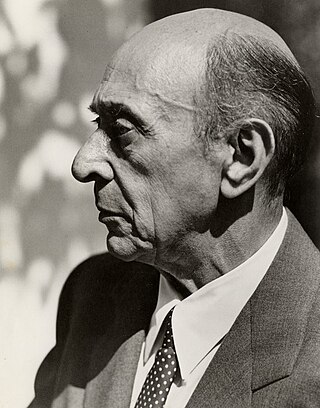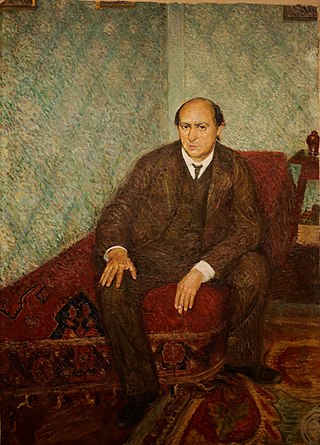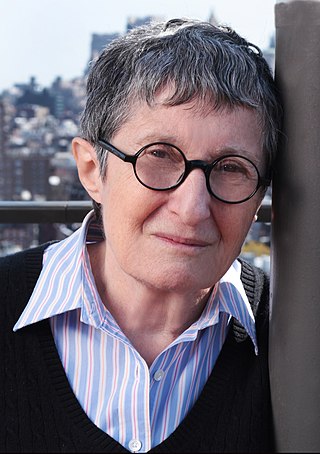See also
- Schönberg (disambiguation), Schoenberg is a common re-spelling of Schönberg
- Shoenberg (disambiguation)
- Schöneberg (disambiguation)
Schoenberg (German : beautiful mountain) is a surname. Notable persons with that surname include:

Arnold Schoenberg or Schönberg was an Austrian-American composer, music theorist, teacher, writer, and painter. He is widely considered one of the most influential composers of the 20th century. He was associated with the expressionist movement in German poetry and art, and leader of the Second Viennese School. As a Jewish composer, Schoenberg was targeted by the Nazi Party, which labeled his works as degenerate music and forbade them from being published. He emigrated to the United States in 1933, becoming an American citizen in 1941.
The Violin Concerto by Arnold Schoenberg dates from Schoenberg's time in the United States, where he had moved in 1933 to escape Nazi Germany. The piece was written in 1936, the same year as the String Quartet No. 4. At the time of its completion, Schoenberg was living in Brentwood, Los Angeles, and had just accepted a teaching position at the University of California, Los Angeles. The work is dedicated to Anton Webern.
Schönberg may refer to:
Arnold Schoenberg's Piano Concerto, Op. 42 (1942) is one of his later works, written in America. It consists of four interconnected movements: Andante, Molto allegro, Adagio, and Giocoso. Around 20 minutes long, its first performance was given on February 6, 1944, at NBC Orchestra's Radio City Habitat in New York City by Leopold Stokowski and the NBC Symphony Orchestra with Eduard Steuermann at the piano. The first UK performance was on 7 September 1945 at the BBC Proms with Kyla Greenbaum (piano) conducted by Basil Cameron. The first German performance took place at the Darmstadt Summer School on 17 July 1948 with Peter Stadlen as the soloist.

Eduard Steuermann was an Austrian-born American pianist and composer.

Max Deutsch was an Austrian-French composer, conductor, and academic teacher. He studied with Arnold Schönberg and was his assistant. Teaching at the Sorbonne and the École Normale de Musique de Paris, he influenced notable students such as Philippe Capdenat, Donald Harris, György Kurtág and Philippe Manoury.

Verklärte Nacht, Op. 4, is a string sextet in one movement composed by Arnold Schoenberg in 1899. Composed in just three weeks, it is considered his earliest important work. It was inspired by Richard Dehmel's poem of the same name, combined with the influence of Schoenberg's strong feelings upon meeting the sister of his teacher, Alexander von Zemlinsky (1877–1923), whom he married in 1901. The movement can be divided into five distinct sections which refer to the five stanzas of Dehmel's poem; however, there are no unified criteria regarding movement separation.
The Austrian composer Arnold Schoenberg published four string quartets, distributed over his lifetime: String Quartet No. 1 in D minor, Op. 7 (1905), String Quartet No. 2 in F♯ minor, Op. 10 (1908), String Quartet No. 3, Op. 30 (1927), and the String Quartet No. 4, Op. 37 (1936).

A Survivor from Warsaw, Op. 46, is a cantata by the Los Angeles-based Austrian composer Arnold Schoenberg, written in tribute to Holocaust victims. The main narration is unsung; "never should there be a pitch" to its solo vocal line, wrote the composer.

Von heute auf morgen is a one act opera composed by Arnold Schoenberg, to a German libretto by "Max Blonda", the pseudonym of Gertrud Schoenberg, the composer's wife. It is the composer's opus 32.

Drei Klavierstücke, Op. 11, is a set of pieces for solo piano written by the Austrian composer Arnold Schoenberg in 1909. They represent an early example of atonality in the composer's work.

The Five Pieces for Orchestra, Op. 16, were composed by Arnold Schoenberg in 1909, and first performed in London in 1912. The titles of the pieces, reluctantly added by the composer after the work's completion upon the request of his publisher, are as follows:
The Arnold Schönberg Center, established in 1998 in Vienna, is a repository of Arnold Schönberg's archival legacy and a cultural center that is open to the public.
Die Jakobsleiter is an oratorio by Arnold Schoenberg that marks his transition from a contextual or free atonality to the twelve-tone technique anticipated in the oratorio's use of hexachords. Though ultimately unfinished by Schoenberg, the piece was completed and prepared for performance by Schoenberg student Winfried Zillig at the request of Gertrude Schoenberg.
Shoenberg is a surname. Notable people with the surname include:
The International Arnold Schönberg Prize was established in 2001, and named after the Austrian composer Arnold Schönberg, on initiative of Kent Nagano, the former principal conductor and musical director of the Deutsches Symphonie-Orchester Berlin, together with Deutschlandradio. The prize is awarded by the Arnold Schönberg Center to international composers. The prize money is €12,500.
Gertrud Bertha Schoenberg was an Austrian opera librettist. She was the second wife of Austrian composer Arnold Schoenberg, whom she married in 1924, and the sister of his pupil, the violinist Rudolf Kolisch.

Nancy Bogen is an American author-scholar, mixed media producer, and digital artist.
Leonard David Stein was a musicologist, pianist, conductor, university teacher, and influential in promoting contemporary music on the American West Coast. He was for years Arnold Schoenberg's assistant, music director of the Schoenberg Institute at USC, and among the foremost authorities on Schoenberg's music. He was also an influential teacher in the lives of many younger composers, such as the influential minimalist La Monte Young.